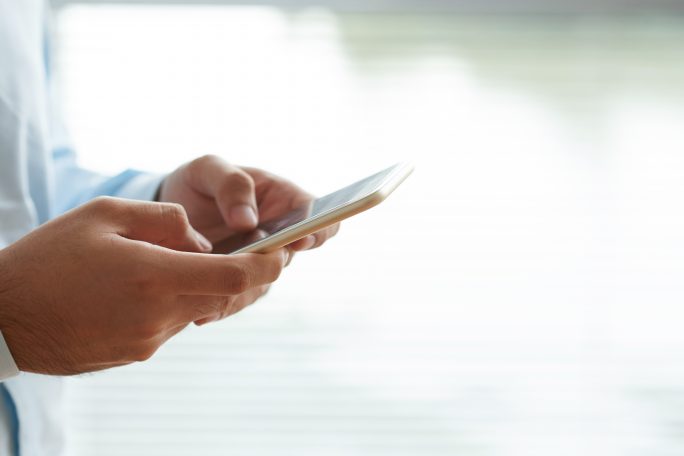The smartphone has become an indispensable part in many areas of work. In some industries, a mobile phone with internet access is part of the basic equipment and is therefore provided by the company. Depending on the arrangement, private use of a cell phone may also be permitted. However, there are some things to consider.
 https://elements.envato.com/es/using-mobile-app-DCNP6KT
https://elements.envato.com/es/using-mobile-app-DCNP6KT
No private use without express permission
Employees who wish to use their company’s cell phone for private purposes must obtain permission from their supervisor. Legal certainty exists only with their consent. If only there is a tolerance, employees bear the burden of proof in the event of a dispute.
It is recommended for both parties to write down the details of cell phone usage in detail. Assumption of costs, data security and confidentiality as well as out-of-hours availability must be determined. In this way, misunderstandings and misinterpretations can be avoided and all involved are optimally protected under labor law.
If the employer expressly excludes private use, employees can use their company’s cell phone to:
– Do not make private phone calls,
– do not send private messages,
– Don’t check private emails and
– Do not use the Internet or applications for private purposes.
Data protection on company mobile phones: this should be considered
Data protection is one of the most important points when using a company’s cell phone for private purposes. Safe work on the go must be ensured above all else if sensitive data such as phone numbers, internal reports or trade secrets are stored on the device. WhatsApp messenger in particular poses a problem in this regard because it does not work with General Data Protection Regulation (General Data Protection Regulation).
When using the app, the entire address and phone list, including names, phone numbers, and email addresses, are sent to US servers, regardless of whether the contacts are from WhatsApp users themselves. This means that there is no data protection legality for the transfer of personal data in accordance with Article 6 of the GDPR.
So many employers restrict private use so that only company-approved apps can be installed. In addition, connection to public networks may be blocked for data protection reasons.
Check the Company’s Cell Phone: What Can the President Do?
An employer is allowed to monitor company cell phones that are not fully approved for private use. It is allowed to listen to phone calls, read emails, and view stored files such as photos, videos, text files, and audios. Connection logs and websites visited may also be checked.
In an emergency situation, a GPS tracking For a mobile phone that is contractually approved for commercial use only. However, there must be a valid reason and the employee’s consent to this. If these prerequisites are not met, monitoring the site means a violation of privacy and personal rights.
If employees are allowed to use their company’s cell phone privately, checks by their employer are taboo. If an employee does not expressly agree to a control, his superior must abide by the confidentiality of communications.
No obligation to be available at all times
Employees who have received a company cell phone from their employer do not have to be permanently available on it. The smartphone can be turned off after work, on Sundays and public holidays, unless the employee is on call. However, there is also a separate bonus or vacation instead. It is better to stay at home during the vacation, so as not to be tempted and at the same time avoid unnecessary risks.
Liability for defects, loss or theft
If the smartphone is damaged, the business owner is usually responsible. Employees only have to pay for the damage if they caused it through gross negligence. The same applies to theft. There is gross negligence, for example, if the cell phone is left in the open car so that it is visible and easily accessible to thieves. If a mobile phone is stolen despite proper safety precautions, it is mostly a case of slight negligence.
Does the employee not have a cell phone for his company Password or PIN is lockedDamage from theft can increase significantly. Under these circumstances, a data protection breach threatened with a fine under GDPR such as trade secret spying or hacker attack carried out with the help of stolen data can be conceivable. In this case, the employee not only has to replace the smartphone, but also bear responsibility for any consequences arising from the loss.
What are the useful tariffs for the company’s mobile phones?
This depends above all on how much the smartphone is used. If the company’s cell phone will offer the widest possible range of functions and, if necessary, serve as the only service connection, a Tariff with flat rate for all networks and unlimited data volume.
conclusion:
A business cell phone with private use option offers both businesses and employees a number of benefits. The business owner avoids the innumerable risks that arise from the use of private mobile phones for corporate purposes. Employees save the costs of acquiring a private cell phone, the stress associated with multiple smartphones, and, at best, even the communication and data costs of private use.
In order for a win-win situation to arise from the provision of the company’s cell phone, the rules of the game for use given by the employer must be adhered to. This also means that the mobile phone and sensitive company data on it are protected against loss and theft using appropriate procedures.

“Devoted gamer. Webaholic. Infuriatingly humble social media trailblazer. Lifelong internet expert.”





